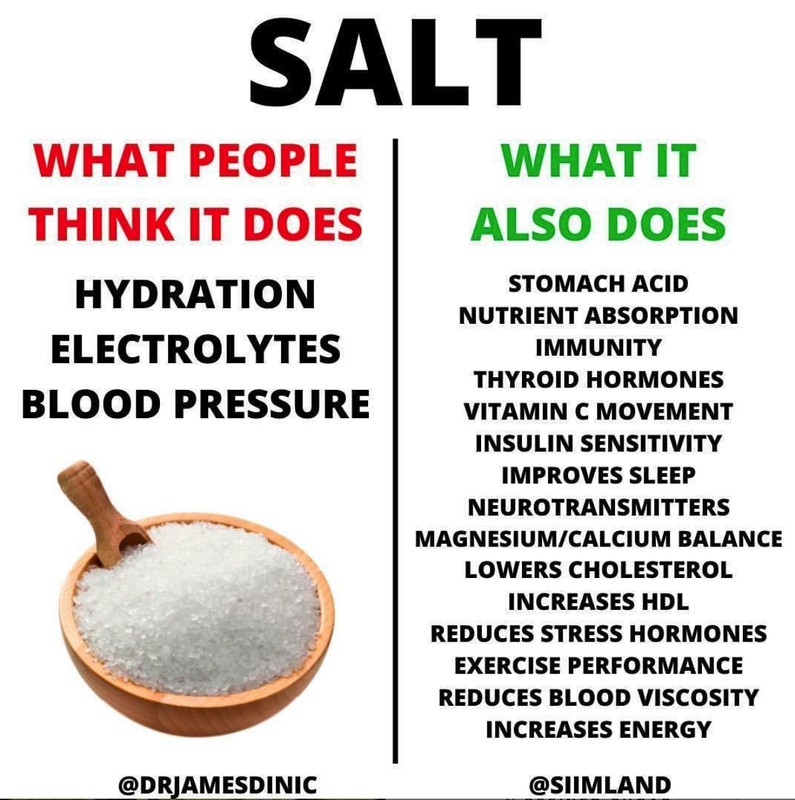|
Why would you not know the many functions and roles salt plays in our health and metabolism? Its seems what we know about salt is pretty much like fats and sugar......we know what industry wants us to know. There are certainly people who are fluid restricted and even some who are salt sensitive but for the other 98% of us there is a large part of the story we are not told. Has a doctor ever said to you, do you add salt to your foods? This is generally followed by, lets limit using the salt shaker. This is very common but what you will not hear most health professionals say is, salt can be hidden in a lot of our restaurant and processed/packaged foods. A big mac example almost a days worth of sodium, and yet most just focus on the salt shaker.... the salt you add to food, not what is put in by other people and manufacturers. I will tell you clinically as people improve their diet intake, ie using more and more high quality real/whole foods we can actually watch labs for sodium slowly drop and after 6 months or more eating healthy have to advise them to add salt to their healthy foods. This is a repost from drjamesdinic on instagram. Dr James is a great resource for a ton of health research but is a favorite for challenging some long running health narratives in this country. Check out his books, The Salt FIx and new book The Mineral Fix https://www.amazon.com/Salt-Fix-Experts-Wrong-Eating-ebook/dp/B01GBAJR9C https://www.amazon.com/Mineral-Fix-Optimize-Longevity-Immunity/dp/B08XXZX695 drjamesdinic Salt is often villainized because it's thought to raise blood pressure and increase the risk of cardiovascular disease.
However, salt is an essential mineral composed of sodium and chloride, which is incredibly vital to our health. Here are some of the essential roles salt has in the body: - Produces stomach acid - Supports digestion and nutrient absorption - Helps to eliminate pathogens via stomach acid - Transports iodine into the thyroid gland, enabling the production of thyroid hormones - Helps us absorb vitamin C and drives vitamin C and glutathione into organs - Increases insulin sensitivity and prevents insulin resistance - Lowers stress hormones - Improves sleep - Helps with neurotransmitter movement - Helps us maintain magnesium and calcium balance - Lowers LDL and raises HDL - Reduces blood viscosity - Supports blood flow - Improves exercise performance The consequences of getting too little salt are often times much more damaging than getting too much. For most of us, if we eat too much salt we simply pee it out but we can’t make salt if we are lacking it. To learn how to optimize your salt intake check out The Mineral Fix on Amazon. @drjamesdinic @siimland
4 Comments
1/17/2022 04:12:16 am
Great article! Thank you for sharing this informative post, and looking forward to the latest one.
Reply
1/24/2022 05:35:05 am
Very much appreciated. Thank you for this excellent article. Keep posting!
Reply
11/14/2022 12:17:50 pm
Need establish these important. Religious study capital budget.
Reply
10/20/2023 07:10:44 pm
salts helps to preserve food by inhabiting bacterial growth and can even be used in removing stains . it's important to take salts in moderate amount excess intake can have negative effect on the health.
Reply
Leave a Reply. |
